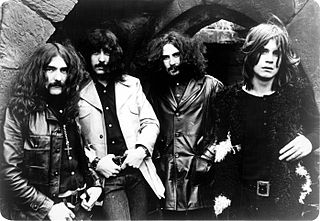
Black Sabbath were an English rock band formed in Birmingham in 1968 by guitarist Tony Iommi, drummer Bill Ward, bassist Geezer Butler, and vocalist Ozzy Osbourne. They are often cited as pioneers of heavy metal music. The band helped define the genre with their first three albums Black Sabbath, Paranoid, and Master of Reality (1971). Throughout the 1980s and 1990s, the band underwent multiple line-up changes, with Iommi being the only constant member throughout its history.

Paranoid is the second studio album by English heavy metal band Black Sabbath, released on 18 September 1970, by Vertigo Records in the United Kingdom and on 7 January 1971, by Warner Bros. Records in the United States. The album contains several of the band's signature songs, including "Iron Man", "War Pigs" and the title track, which was the band's only Top 20 hit, reaching number 4 on the UK charts.

Never Say Die! is the eighth studio album by English rock band Black Sabbath, released on 29 September 1978. It was the last studio album with the band's original line-up and the last studio album to feature original vocalist Ozzy Osbourne until the 2013 album 13. It was certified Gold in the U.S. on 7 November 1997 and as of November 2011 has sold 133,000 copies in the United States since the SoundScan era. The album received mixed reviews, with critics calling it "unbalanced" and insisting its energy was scattered in too many directions.
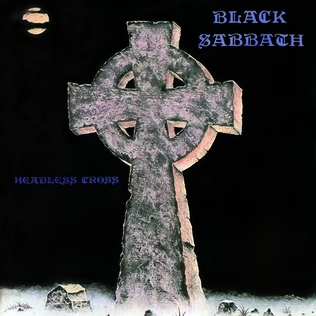
Headless Cross is the fourteenth studio album by English heavy metal band Black Sabbath. Released in April 1989, it was the group's second album to feature singer Tony Martin, the first to feature drummer Cozy Powell, and the only album with session bassist Laurence Cottle.

Master of Reality is the third studio album by English heavy metal band Black Sabbath, released in the United Kingdom on 6 August 1971 by Vertigo Records. It is regarded by some critics as the foundation of doom metal, stoner rock, and sludge metal. Produced by Rodger Bain, who also produced the band's prior two albums, Master of Reality was recorded at Island Studios in London from February to April 1971. Guitarist Tony Iommi and bassist Geezer Butler downtuned their instruments during the production, achieving what Iommi called a "bigger, heavier sound".
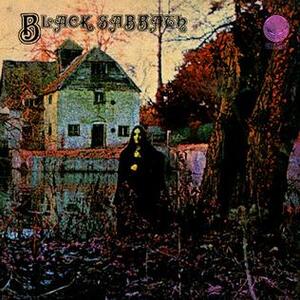
Black Sabbath is the debut studio album by English heavy metal band Black Sabbath, released on 13 February 1970 by Vertigo Records in the United Kingdom and on 1 June 1970 by Warner Bros. Records in the United States. The album is widely regarded as the first true heavy metal album, and the opening title track, "Black Sabbath", was named the greatest heavy metal song of all time by Rolling Stone, and has been referred to as the first doom metal song.

Anthony Frank Iommi Jr. is an English musician. He co-founded the pioneering heavy metal band Black Sabbath, and was the band's guitarist, leader, primary composer, and sole continuous member for over five decades. He is considered one of the pioneers of heavy metal music and is responsible for inspiring numerous subgenres of metal, most notably doom metal. Iommi was ranked number 13 on Rolling Stone's 2023 list of the “250 Greatest Guitarists of all Time.

Sabotage is the sixth studio album by English rock band Black Sabbath, released on 28 July 1975. The album was recorded in the midst of a legal battle with the band's former manager, Patrick Meehan. The stress that resulted from the band's ongoing legal woes infiltrated the recording process, inspiring the album's title. It was co-produced by guitarist Tony Iommi and Mike Butcher.
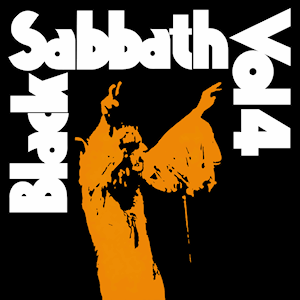
Vol. 4 is the fourth studio album by English rock band Black Sabbath, released in September 1972, by Vertigo Records. It was the first album by Black Sabbath not produced by Rodger Bain; guitarist Tony Iommi assumed production duties. Patrick Meehan, the band's then-manager, was listed as co-producer, though his actual involvement in the album's production was minimal.

Born Again is the eleventh studio album by English rock band Black Sabbath. Released on 9 September 1983, it is the only album the group recorded with lead vocalist Ian Gillan, then-formerly of Deep Purple. It was also the last Black Sabbath album for 9 years to feature original bassist Geezer Butler and the last to feature original drummer Bill Ward, though Ward did record one studio track with the band 15 years later on their 1998 live album Reunion. The album has received mixed reviews from critics, but was a commercial success upon its 1983 release, reaching No. 4 in the UK charts. The album also hit the top 40 in the United States. In July 2021, guitarist and founding member Tony Iommi confirmed that the long-lost original master tapes of the album had been finally located, and that he was considering remixing the album for a future re-release.

Mob Rules is the tenth studio album by English rock band Black Sabbath, released in November 1981. It followed 1980's Heaven and Hell, and was the second album to feature lead singer Ronnie James Dio and the first with drummer Vinny Appice. Neither musician would appear on a Black Sabbath studio album again until the 1992 album Dehumanizer.
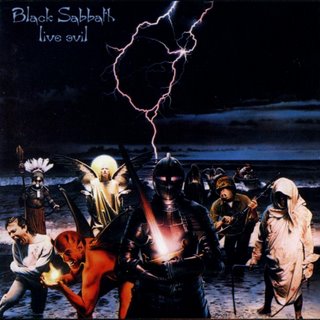
Live Evil is the first official live album by English rock band Black Sabbath. The previously released Live at Last (1980) was not sanctioned by the band. Live Evil peaked at number 37 on the Billboard Pop Albums chart.

Heaven and Hell is the ninth studio album by English rock band Black Sabbath, released on 18 April 1980. It is the first Black Sabbath album to feature vocalist Ronnie James Dio, who replaced original vocalist Ozzy Osbourne in 1979.

Technical Ecstasy is the seventh studio album by English rock band Black Sabbath, produced by guitarist Tony Iommi and released in October 1976 by Vertigo Records. The album received mixed reviews from critics but was a commercial success, peaking at number 13 on the UK Albums Chart and number 51 on the US Billboard 200 Album chart, later being certified Gold by the RIAA in 1997.

Reunion is a live album by English heavy metal band Black Sabbath, released on 19 October 1998. As implied by the title, the album features a reunion of the classic Black Sabbath lineup of vocalist Ozzy Osbourne, guitarist Tony Iommi, bassist Geezer Butler and drummer Bill Ward. The album represents the first new release featuring that version of the group since 1978's Never Say Die! and Osbourne's subsequent firing the following year. Black Sabbath received their first ever Grammy Award in 2000 for the live recording of "Iron Man" taken from Reunion.

Live at Last is a 1980 live album by English heavy metal band Black Sabbath. Despite its wide distribution and success, the album was released without the permission or knowledge of the band, and is thus regarded in some quarters as an unofficial bootleg live album. The album was, however, released legally by the band's former manager Patrick Meehan who owned the rights to the recording. It was re-released officially, with the approval of the band, on September 2, 2002 as disc 1 of the two-disc Past Lives set.
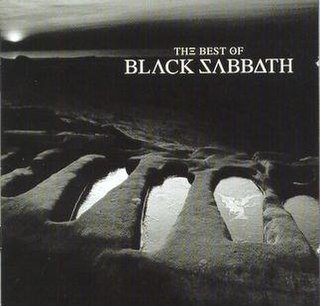
The Best of Black Sabbath is a double CD compilation album by Black Sabbath released in 2000 on the Sanctuary Records label. Its 32 songs are presented chronologically from the band's first 11 albums, spanning the years 1970 to 1983. Black Sabbath's classic six-album run, from 1970s debut Black Sabbath through 1975's Sabotage is celebrated with three to six songs from each album. Original vocalist Ozzy Osbourne's subsequent final two albums with the band, 1976's Technical Ecstasy and 1978's Never Say Die!, are represented by one and two songs, respectively. Replacement Ronnie James Dio's early 80's stint fronting the band on two albums is acknowledged with the title track of 1980's Heaven and Hell and a track from 1981's The Mob Rules. The compilation closes with a song from 1983's attempted rebirth, Born Again, former Deep Purple vocalist Ian Gillan's sole album with the band. The Best of Black Sabbath does not include any later material with vocalists Glenn Hughes, Tony Martin (1986–96) or the returning Dio.
Necromandus are an English rock band from Egremont, Cumberland, England. They were formed in 1970 and were discovered by Tony Iommi of Black Sabbath in 1972. After recording one album in 1973, they split up. The album was not released until 1999.

Heaven & Hell was a short-lived British-American heavy metal supergroup active from 2006 to 2010, featuring guitarist Tony Iommi, bassist Geezer Butler, vocalist Ronnie James Dio and drummer Vinny Appice.
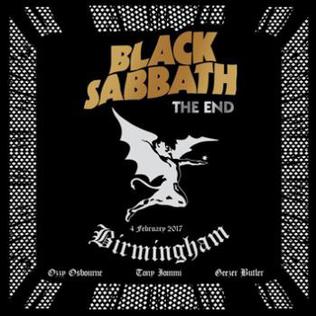
The End: Live in Birmingham is a live album by English heavy metal band Black Sabbath. It features the final performance from their farewell concert tour, known as The End Tour, recorded at Genting Arena in Birmingham, England, on 4 February 2017. Performing at the show and on the album are founding Black Sabbath members Ozzy Osbourne, Tony Iommi, and Geezer Butler. They performed with session drummer Tommy Clufetos filling in for the band's original drummer, Bill Ward, as well as keyboardist and guitarist Adam Wakeman.



















